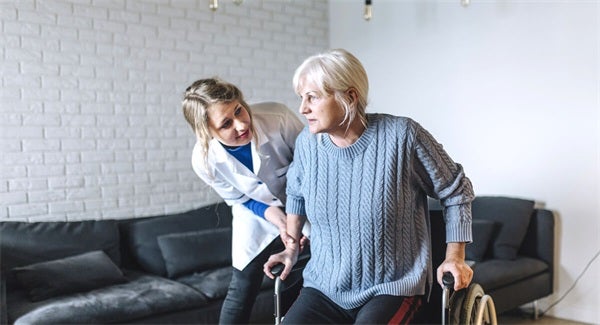
As the global population ages, the demand for specialized care solutions for seniors grows exponentially. Assisted living facilities, a cornerstone of senior care, provide an essential blend of independence and support for older adults who may need help with daily activities but cherish their autonomy. The key to these facilities' success lies in their ability to create a nurturing environment that combines personal freedom with necessary assistance. Assisted living communities offer seniors a chance to remain socially active, receive medical support, and enjoy a fulfilling lifestyle, underscoring the importance of comprehensive care solutions. However, as more seniors transition to these communities, mobility challenges can arise, emphasizing the importance of practical and comfortable solutions like the VELA Chair. These mobility options enhance seniors' quality of life, promoting safety and ease of movement within assisted living environments.
The purpose and benefits of assisted living
Assisted living is designed to provide a middle ground between complete independence and full-time care. This setting offers personalized assistance with activities of daily living such as bathing, dressing, and medication management. By integrating services like housekeeping, meals, and transport, assisted living ensures that residents can focus on what truly matters—enjoying their lives and engaging with their community. One of the primary benefits of assisted living is its focus on promoting socialization and mental well-being through activities and wellness programs, fostering a strong sense of community among residents. Facilities incorporate resident preferences into their programming, ensuring personalized care that respects individual needs. For anyone considering transitioning to a supportive living environment, exploring options like those offered by assisted living providers is essential to making an informed decision.
An introduction to mobility solutions with the VELA chair
Mobility solutions play a pivotal role in helping maintain a comfortable and independent lifestyle within assisted living facilities. The VELA Chair stands out as a premier option for enhancing mobility and accessibility for elderly individuals. Designed specifically as a chair for the elderly, the VELA Chair offers features that increase user safety and independence. It allows seniors to move around with ease and engage in daily activities with greater confidence and comfort. For those in assisted living, choosing an appropriate mobility aid can significantly impact their day-to-day experience. The VELA Chair is engineered to prioritize safety and stability while providing functional solutions that align with the evolving needs of seniors. By offering a combination of ergonomic design and modern technology, the VELA Chair contributes to a more adaptable and inclusive living environment for seniors. More insights on the benefits of such innovative mobility aids for chair for the elderly are valuable for caregivers and family members supporting senior loved ones.
Financial considerations in assisted living
The cost of assisted living can be a significant concern, with rates varying widely depending on location and services offered. Despite the potential financial burden, several funding options are available. Medicaid can help cover some costs, but typically not room and board, while eligibility depends on specific criteria. Medicare, however, generally does not cover the standard living expenses of assisted living, focusing more on medical care coverage. Veterans benefits provide another avenue of financial assistance for eligible seniors, and some facilities offer sliding scale fees or accept long-term care insurance. Researching these options at the onset is vital for families planning a transition to assisted living, ensuring that seniors can comfortably afford the care services tailored to their needs. Addressing these financial elements proactively facilitates a smoother transition and peace of mind for families and residents alike.
Enhancing the quality of life in assisted living
Quality of life is a fundamental priority in assisted living facilities, influencing the overall well-being and satisfaction of residents. These facilities offer a range of social activities, health programs, and amenities designed to enrich the lives of seniors. Regular social interaction and community engagement are encouraged, significantly impacting residents' mental health and reducing feelings of isolation. Additionally, many facilities incorporate state-of-the-art safety features and privacy considerations to respond to the diverse needs of their residents effectively. By promoting autonomy while providing necessary assistance, assisted living ensures a harmonious balance between support and independence for its residents. Understanding these dynamics helps families choose the right community for their loved ones, ensuring they receive the care and companionship they deserve.
Regulations and advocacy in assisted living
Assisted living facilities operate under stringent regulatory frameworks to ensure high standards of care and safety. These regulations vary by state, covering aspects such as staff qualifications, safety protocols, and resident rights. Compliance with these standards is crucial for facilities to maintain licensure and deliver optimal care. Additionally, advocacy and support resources play a key role in the ongoing development and improvement of assisted living services. They provide platforms for residents and families to voice concerns and contribute to the enhancement of care practices. As the industry evolves, continuous efforts to uphold and advance care quality are paramount, ensuring that assisted living communities remain a reliable and nurturing environment for seniors. Staying informed about these regulatory requirements and advocacy efforts helps families and caregivers make educated decisions about resident care and facility selection.
In conclusion, the synergy of assisted living services and innovative mobility solutions like the VELA Chair forms a robust framework supporting the needs of seniors. Understanding these elements enables families and caregivers to navigate the complexities of senior care efficiently, ensuring that the aging population can enjoy their golden years with dignity, fulfillment, and independence.